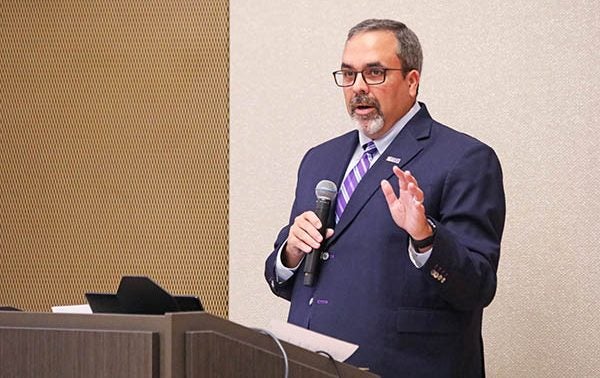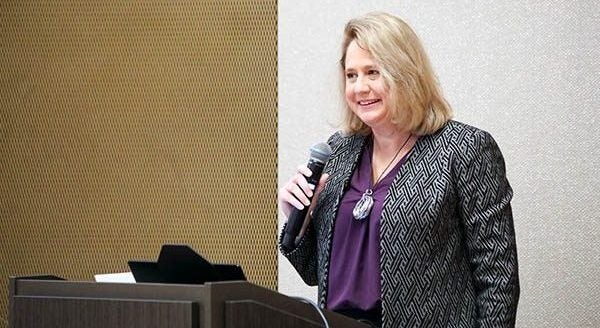Partnership Teach celebrates 20 years, 1,000 graduates
East Carolina University’s Partnership Teach program celebrated 20 years of operation and more than 1,000 graduates during its Nov. 3 joint advisory board meeting with the Latham Clinical Schools Network.

Dr. Chris Locklear, ECU chief of staff, spoke about the Partnership Teach program at the Nov. 3 joint advisory board meeting in the Main Campus Student Center. (Photos by Kristen Martin)
“What a great day that we can gather to celebrate a 20-year partnership that has evolved over the years and strengthened — being able to prepare 1,000 graduates to go into our schools and to provide an excellent education to our young people,” said Dr. Art Rouse, College of Education acting dean.
Partnership Teach aims to increase the number of teachers in North Carolina by offering affordable, online degree completion for students wanting to teach in their hometowns. The program offers degrees in elementary education, middle grades education and special education.
“The College of Education is about creating and establishing partnerships such as Partnership Teach so that we can continue to make a difference in the region that we serve and the communities that we serve,” Rouse said.
The advisory board meeting brought together representatives from the community colleges and school districts to discuss updates for both programs. Two guests — Dr. Chris Locklear, chief of staff at ECU, and Dr. Laura Bilbro-Berry, executive director of educator preparation and lab schools for the UNC System — were invited to speak about the history and impact of Partnership Teach.
“Over these two decades, there have been plenty of changes among coordinators, faculty, administrators, but the reason for the longevity, at least in my view, rests in the people committed to a mission and a region,” Locklear said.
When Partnership Teach was founded, ECU had deep relationships with local school systems and wanted to emulate that connection with community colleges. Locklear spoke of Anne Faulkenberry, a key figure in the founding and continuation of the program.
“It was genius to select Anne to lead the first service area because she was already trusted and known in her local community,” he said. “She was a person of integrity and a consummate professional. Most importantly, Anne was perhaps the most student-centered person I’ve ever known.”
Faulkenberry’s focus on connecting with students and investing in their success is something that coordinators continue to follow today.
“We do this work together because we know the value of a great teacher and the added value of an individual committed to a community,” Locklear said.
The Partnership Teach model allows students to complete their first two years of their teaching degree at a local community college and then transfer to ECU to complete their degree through online courses without leaving their home communities. This has enabled individuals who may not have been able to pursue their education degree the chance to obtain it.

Dr. Laura Bilbro-Berry recalled her time working with Partnership Teach during the Partnership Teach and Latham Clinical Schools Network joint advisory board meeting on Nov. 3.
“As a first-generation college graduate myself, it’s never lost on me that for many, this isn’t just an individual dream realized. From meeting cohorts, I’ve recalled the stories of dreams deferred, delays for family, fear of navigating the complexities of transferring, which together we have all improved,” Locklear said. “Our work has not only altered the trajectory of the lives of the graduates, we have connected people with a passion to an opportunity to serve their local communities.”
In reflecting on her years at ECU, Bilbro-Berry shared the story of the first student she helped through Partnership Teach: a mother whose children had grown up and who decided she wanted to become a teacher.
“I had the opportunity to help her realize something that she didn’t think she could ever do,” Bilbro-Berry said.
When she thinks of Partnership Teach, there are three things Bilbro-Berry said are important: the mission of filling classrooms, particularly rural classrooms, with well-prepared teachers; ensuring the program is an affordable option; and the people who choose the program.
“They’re special because they’re taking that leap of faith,” she said. “For many of them, it’s a scary enterprise, but this partnership allows them to do that in a way that’s not only convenient, but also nurtured as they go through their program.”
Bilbro-Berry noted Partnership Teach’s success in graduating teachers to classrooms, especially in eastern North Carolina.
“Partnership Teach is like no other in the state,” she said. “The track record is amazing. This work is important to this part of the state, but it’s important to our whole state of North Carolina.”